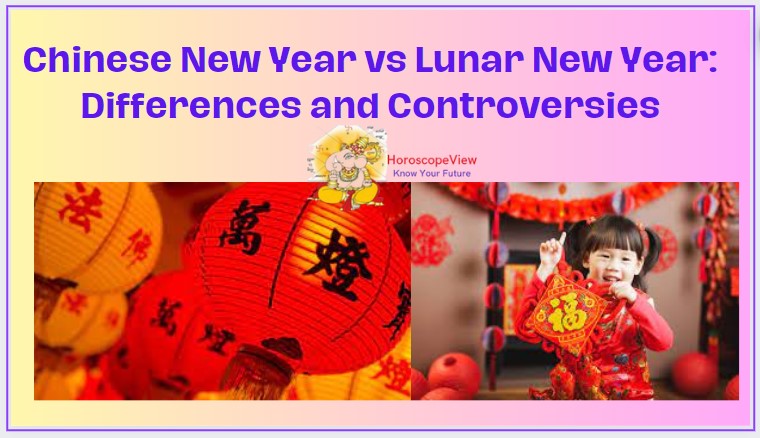Chinese New Year vs Lunar New Year: Chinese New Year is approaching very near. Wait, is it really okay to call Chinese New Year as Chinese New Year Or should we call it actually as Lunar New Year? Or something else? Let’s figure it out. Chinese New Year and Chinese Lunar New Year are the same thing?
Chinese New Year vs Lunar New Year
Simply put, Chinese New Year and Lunar New Year are not the same thing. Despite the connections, there are some notable differences between the two.
In this post, you will get all about what are the differences between Chinese New Year and Lunar New Year.
The 12-year cycle of the Chinese zodiac
1. Chinese New Year” is special in life when the and month and is more common. If you are specifically referring to a New Year event celebrating Chinese traditions and culture, you can call it “Chinese New Year”.
Outside China, referring to the Lunar New Year and Chinese New Year and conversely, can become insensitive and offensive because it ignores other cultures, each with its own unique traditions, beliefs and celebrations.
2. How each Asian country celebrates and calls its New Year holiday is different.
The Lunar New Year is celebrated in many Asian countries, including China,, Korea, Singapore, Vietnam and Malaysia. While some traditions are common, others are unique to each country and cultural identity.
In China, the Lunar New Year is called Chūnjié (/chwnn-jyeah/), which means both#039;Spring Festival or “Chinese New Year”. It is known for creating a new sign in the 12-year cycle of the Chinese animal zodiac. Popular activities include putting up lanterns and spring parties, eating reunion dinners full of cheap food, shooting firecrackers and fireworks, and handing out red envelopes. Learn more about celebrating Chinese New Year.
Chinese and Lunar New Year in Vietnam, South Korea and More
In Vietnam, the new moon is known as and Tếtand or “Vietnamese New Year” Vietnamese zodiac signs include a cat instead of a rabbit and a buffalo instead of a bull. The Vietnamese have their traditional cake (bánh chưng) and decorate their houses with hoađào (peach blossom trees) or hoamai (yellow Mai flower, a type of tree with yellow flowers).
In South Korea, the Lunar New Year is called Seollal (/sŏllal/). During the festival, many Koreans wear traditional Korean clothing called hanbok, perform ancestral rituals, worship elders, and eat traditional foods such as tteokguk (soup with sliced rice cakes) and jeon (pancakes).
3. Chinese New Year and Lunar New Year may be different dates. There are countries that share the interpretation of the Chinese calendar, such as Korea, Japan and Vietnam, and therefore celebrate the Lunar New Year at the same (or almost the same) time.
However, there are many other countries or cultures that use their own lunar calendars and the New Year falls at different times. Mongolian lunar calendars, as well as Islamic and Jewish calendars for example, all have different months and cycles and are therefore celebrated on different days.
Today, Chinese New Year is almost always celebrated on the second new moon after the winter solstice, so it falls between late January and mid-February. Other cultures Instead, Lunar New Year celebrations are usually held on the first new moon after the winter solstice.
What Is Your Zodiac Sign? Click Now
Chinese New Year and Lunar New Year Controversies
In recent years, the issue of the correct terminology to celebrate the Chinese New Year has unfortunately caused controversy. Some argue that referring to the celebration of Chinese New Year can be insensitive because many other cultures celebrate the same holiday under a different name on this day, so it’s not strictly Chinese.
On the other hand, referring to it as the “Lunar New Year and willingly ignores other cultures Lunar New Year terms that can even fall on different dates and are completely different celebrations.
The influence of Chinese New Year on other Lunar New Years
Chinese New Year decorations
Despite some differences, many Lunar New Year celebrations around the world, whether or not they coincide with the Chinese New Year, still have many striking similarities, largely due to the enormous global influence of the Chinese New Year throughout the ages.
Most other Far Eastern and Southeast Asian cultures that celebrate their lunar year have many symbols and practices associated with Chinese celebrations, such as the use of red, fireworks and firecrackers (which have ancient Chinese cultural significance), lion dances. or dragon dances.
So, shall we call it “Chinese New Year” or “moon on New Year’s land ? There is no problem using the two terms interchangeably in casual conversation. Whether it’s called Chinese New Year or Lunar New Year, as long as no offense is intended, it’s safe to say that almost everyone is more than happy to share and celebrate this festive event around the world. , what is it called!
However, in a stricter cultural environment, doing it wrong can lead to misunderstandings or arguments. Therefore, you should treat names like this: When talking about Chinese New Year to the Chinese or to someone from a culture where no other lunar year is traditionally celebrated, it is safe to say “Chinese New Year vs Lunar New Year or “Spring Festival”.
When talking about the new year to someone of other Asian heritage, it is best to say “month and or use culturally specific or local terms. For example, for Vietnamese people, use “Vietnamese New Year” and or better, say and Tếtand show respect and knowledge.
Related:
References:


Leave a Reply